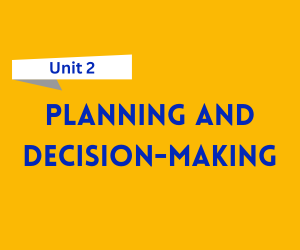Looking for simplified and reliable notes for Unit 2: Planning, Strategy & Policy from your Principles of Management subject? You’re in the right place!
This unit focuses on some of the most essential managerial activities — planning, decision-making, forecasting, and strategy formulation — all of which are vital in building strong business fundamentals during your BBA 1st Semester.

Download Unit 2 – Planning, Strategy & Policy Notes
Click the link below to download unit-wise, high-quality PDF notes for BBA students:
⬇️
Download Unit 2 Notes PDF
Our notes are aligned with top Indian universities’ syllabi and prepared for easy revision and exam success.
Nature and Importance of Planning
Planning is the first and foremost function of management. It involves setting objectives and deciding how to achieve them.
In this section, you’ll learn:
What is planning in management?
Why planning is crucial for organizational success
How it helps reduce uncertainty and improve efficiency
Good planning ensures that all departments move in the same direction with a clear focus.
Types of Plans
Managers at different levels create various types of plans:
Strategic plans (long-term, created by top management)
Tactical plans (mid-term, created by middle management)
Operational plans (short-term, created by lower management)
Understanding these types will help you connect theory with practical business operations.
Steps in the Planning Process
This unit walks you through the step-by-step process of planning, which includes:
Setting objectives
Developing premises
Identifying alternatives
Evaluating alternatives
Selecting the best alternative
Implementing the plan
Monitoring and follow-up
Each step is essential for effective and goal-oriented management.
Objectives and MBO (Management by Objectives)
Objectives are the end results that an organization aims to achieve.
You will also explore the concept of MBO (Management by Objectives) — a modern approach where managers and employees jointly set goals to improve performance and accountability.
MBO promotes transparency, motivation, and team alignment.
Decision Making – Process, Types & Techniques
A core role of every manager is to make effective decisions.
In this section, you’ll cover:
Decision-making process: Define the problem, gather information, generate alternatives, choose the best, implement, and evaluate
Types of decisions: Programmed vs. non-programmed decisions
Decision-making techniques: Cost-benefit analysis, SWOT analysis, brainstorming, etc.
These tools are used across industries for solving business problems efficiently.
Forecasting – Importance and Methods
Forecasting involves predicting future conditions based on data and analysis. It’s vital for budgeting, planning, and risk management.
Key methods include:
Qualitative forecasting: Expert opinion, market research
Quantitative forecasting: Time series analysis, regression models
You’ll understand how forecasting supports better strategic planning in uncertain environments.
Strategy and Policy – Meaning & Importance
In business, strategy defines the long-term direction of an organization. Policies, on the other hand, are guidelines that shape decision-making within that strategy.
This section will help you understand:
What are strategy and policy?
Types of strategies: Growth, stability, retrenchment, etc.
Types of policies: General vs. specific, internal vs. external
The difference between strategic planning and operational planning
